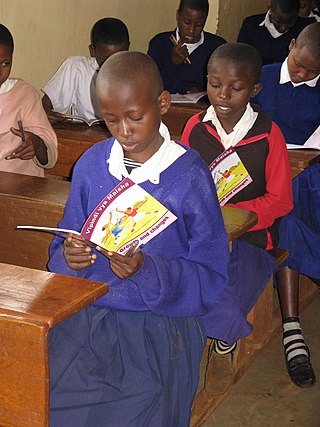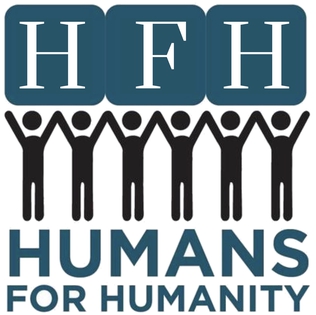ISO 3166 is a standard published by the International Organization for Standardization (ISO) that defines codes for the names of countries, dependent territories, special areas of geographical interest, and their principal subdivisions. The official name of the standard is Codes for the representation of names of countries and their subdivisions.

A tampon is a menstrual product designed to absorb blood and vaginal secretions by insertion into the vagina during menstruation. Unlike a pad, it is placed internally, inside of the vaginal canal. Once inserted correctly, a tampon is held in place by the vagina and expands as it soaks up menstrual blood. However, in addition to menstrual blood, the tampon also absorbs the vagina's natural lubrication and bacteria, which can change the normal pH, increasing the risk of infections from the bacterium Staphylococcus aureus, which can lead to toxic shock syndrome (TSS). TSS is a rare but life-threatening infection that requires immediate medical attention.

A menstrual cup is a menstrual hygiene device which is inserted into the vagina during menstruation. Its purpose is to collect menstrual fluid. Menstrual cups are made of elastomers. A properly fitting menstrual cup seals against the vaginal walls, so tilting and inverting the body will not cause it to leak. It is impermeable and collects menstrual fluid, unlike tampons and menstrual pads, which absorb it.

A menstrual pad, or simply a pad, is an absorbent item worn in the underwear when menstruating, bleeding after giving birth, recovering from gynecologic surgery, experiencing a miscarriage or abortion, or in any other situation where it is necessary to absorb a flow of blood from the vagina. A menstrual pad is a type of menstrual hygiene product that is worn externally, unlike tampons and menstrual cups, which are worn inside the vagina. Pads are generally changed by being stripped off the pants and panties, taking out the old pad, sticking the new one on the inside of the panties and pulling them back on. Pads are recommended to be changed every 3–4 hours to avoid certain bacteria that can fester in blood; this time also may differ depending on the kind worn, flow, and the time it is worn.

Feminine hygiene products are personal care products used during menstruation, vaginal discharge, and other bodily functions related to the vulva and vagina. Products that are used during menstruation may also be called menstrual hygiene products, including menstrual pads, tampons, pantyliners, menstrual cups, menstrual sponges and period panties. Feminine hygiene products also include products meant to cleanse the vulva or vagina, such as douches, feminine wipes, and soap.
Always is an American brand of menstrual hygiene products, including maxi pads, ultra thin pads, pantyliners, disposable underwear for night-time wear, and vaginal wipes. A sister company of Procter & Gamble, it was first invented and introduced in the United States in 1983 by Tom Osborn, a mid-level employee at Procter & Gamble, then nationally in May 1984. By the end of 1984, Always had also been introduced internationally in the United Kingdom, Canada, France, Germany, Arab world, Pakistan and Africa. Despite the Always' pads runaway international success, Procter & Gamble almost fired Tom Osborn twice in the early 1980s as he was developing this product.

Cloth menstrual pads are cloth pads worn in the underwear to collect menstrual fluid. They are a type of reusable menstrual hygiene product, and are an alternative to sanitary napkins or to menstrual cups. Because they can be reused, they are generally less expensive than disposable pads over time, and reduce the amount of waste produced.

ISO 22000 is a food safety management system by the International Organization for Standardization (ISO) which is outcome focused, providing requirements for any organization in the food industry with objective to help to improve overall performance in food safety. These standards are intended to ensure safety in the global food supply chain. The standards involve the overall guidelines for food safety management and also focuses on traceability in the feed and food chain.
UN/CEFACT TBG5 is the entity responsible for financial services under the United Nations Centre for Trade facilitation and Electronic Business, (UN/CEFACT) under the United Nations Economic Commission for Europe (UNECE).
Date and time notation in South Africa describes methods of expressing date and time used South Africa.
GladRags is a feminine hygiene company based in Portland, Oregon that produces reusable cloth menstrual pads and menstrual cups.

Tampon tax is a popular term used to call attention to tampons, and other feminine hygiene products, being subject to value-added tax (VAT) or sales tax, unlike the tax exemption status granted to other products considered basic necessities. Proponents of tax exemption argue that tampons, menstrual pads, menstrual cups and comparable products constitute basic, unavoidable necessities for women, and any additional taxes constitute a pink tax.

Days for Girls (DfG) is a nonprofit organization that prepares and distributes sustainable menstrual health solutions to girls who would otherwise miss school during their monthly periods. DfG was founded in 2008 by American Celeste Mergens. After visiting an orphanage in Nairobi, Kenya, she discovered that menstruating girls stayed in their dormitories for days, sitting on cardboard to absorb their flow, because they could not afford feminine hygiene products. Her first response was to organize donations of disposable sanitary pads, but she realized that this was not a sustainable solution as the girls had no way to dispose of used pads. She then developed the idea of creating washable, reusable pads and providing the girls with a personal kit of all they would need to continue their schooling with hygiene and dignity. By 2018, the DfG Kits and health education programs had reached more than one million girls and women in over 100 countries.

Anurag Chauhan is an Indian social worker and founder of Humans For Humanity, a non-governmental organization (NGO) headquartered in Dehradun, India He is known for social work, particularly with regards to menstrual hygiene. The WASH project started by him has reached over 3.5 million women in over 6 states in last 5 years.

Menstrual hygiene management (MHM) or menstrual health and hygiene (MHH) refers to access to menstrual hygiene products to absorb or collect the flow of blood during menstruation, privacy to change the materials, and access to facilities to dispose of used menstrual management materials. It can also include the "broader systemic factors that link menstruation with health, well-being, gender equality, education, equity, empowerment, and rights". Menstrual hygiene management can be particularly challenging for girls and women in developing countries, where clean water and toilet facilities are often inadequate. Menstrual waste is largely ignored in schools in developing countries, despite it being a significant problem. Menstruation can be a barrier to education for many girls, as a lack of effective sanitary products restricts girls' involvement in educational and social activities.
Douce Namwezi N'Ibamba is a journalist, radio producer and social entrepreneur from the Democratic Republic of the Congo (DRC), who empowers women through education and training, with a particular emphasis on gender equality and menstrual hygiene. She is also the president of the board of the cultural space called, Espace Culturel Kwetu Art.

Humans For Humanity (HFH) is a non-governmental organization, founded by renowned social worker Anurag Chauhan, headquartered in Dehradun, India. It is working to bring awareness about menstrual health, hygiene among women across India. It is providing health, hygiene and comfort to women, especially in poverty-stricken and rural areas in India. The organization empowers women by educating women and young girls on menstruation and menstrual hygiene, and by conducting workshops to produce low-cost sanitary pads. The WASH project started by Humans For Humanity has reached over 3 million women in over 6 states in India in the last 6 years, as of October 2020.
Eco Femme is a women-led social enterprise in Tamil Nadu, India, that produces organic washable cloth pads. Eco Femme was founded in 2009 in Auroville by Kathy Walkling and Jessamijn Miedema who started by producing, applying and selling these washable menstrual pads in Auroville. The aim was to produce pads that are both affordable and free of plastic. They were also interested in designing a sustainable alternative to disposable pads for the women of India as well as setting up self sustaining initiatives in cloth pad production for women from the neighbouring villages. All commercially sold pads are organically certified under GOTS and Eco Femme is the first in this space to have achieved this certification. The cloth pads are mostly made out of organic cotton and can last up to 75 washes or for three to five years from the time of purchasing. These pads are sold in more than 20 countries across the world. By 2022, Eco Femme has distributed over 1 million cloth pads which consequently saved more than 75 million single use disposable pads from reaching landfills.

Period poverty is a term used to describe a lack of access to proper menstrual products and the education needed to use them effectively. In total, there are around 500 million women and girls that cannot manage their periods safely due to lack of menstrual products and for fear of shame. The American Medical Women's Association defines period poverty as "the inadequate access to menstrual hygiene tools and educations, including but not limited to sanitary products, washing facilities, and waste management". The lack of access to menstrual hygiene products can cause physical health problems, such as infections and reproductive tract complications, and can have negative social and psychological consequences, including missed school or work days and stigma.
Lillian Bagala is a regional director of Irise International, East Africa and a director for the Uganda Youth Network. She has been part of the Technical Working Committee for USAID – CORE Initiative to review and evaluate proposals and pioneer member in establishing the AFRiYAN - Africa Youth Adolescent Network for sub-Saharan Africa constituted by UNFPA to respond to sexual Reproductive Health issues of young people. She established the Period Equality Network which brings together 85 member organizations across East Africa that champion menstrual health and hygiene work to engage in collective advocacy.













